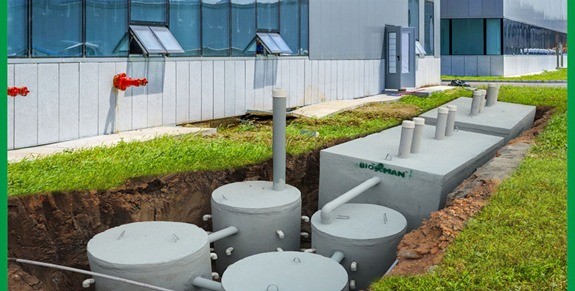When we opt for eco-friendly living, the first things that usually enter our minds are solar panels for power consumption, rainwater harvesting to save water, or replacing appliances with energy-efficient ones. These are not only significant way to live environment friendly, but there’s another aspect that is critical to sustainability—wastewater management system. A biodigester septic system is a modern approach that not only deals with waste but also enhances cleaner, safer, healthier and greener living.
Unlike common septic tanks that store waste until it needs dumping, a biodigester processes it. Natural enzymes and active bacteria break down the waste inside the tank. The output? Healthy environment, minimized pollution, energy savings and even useful materials such as treated water for reuse or biogas for commercial use. Let’s explore why this system is such a buzzword in green living.
What Sets a Biodigester Septic System Apart?
A biodigester is set up to process the human waste in more natural, safer and efficient way. Human waste that enters the tank does not simply sit there—it gets decomposed inside the tank itself. The bacteria within the tank break down organic material into:
1. Treated water – for safe absorption into the soil or reuse in gardening.
2. Biogas – a useful energy resource used for cooking by filling it in cylinders, generating electricity, and fuel for vehicles.
This system eliminates the need for families and communities to depend on large septic trucks which needs large area, chemical injections cause pollution, or overflowing tanks leads to bad odor which are not hygienic. Instead, waste is naturally decomposed and constantly controlled by this system.
Why It’s the Eco-Friendly Choice
1. Cleaner Water, Safer Soil
Conventional septic tank tends to leak raw waste into the soil, results in polluting groundwater and soil. A biodigester septic tank system solves this problem with its natural and energy efficient way because it digests waste prior to release or leakage, which safeguards both the peoples and the environment.
2. No Offensive Odors
Offensive odors are among the largest disadvantages of septic tanks. A biodigester reduces foul odors through natural digestion processes, leaving the environment fresh and clean.
3. Little Maintenance, Huge Savings
Septic tanks require frequent pumping, unclogging, and repair. Biodigesters require much less maintenance, which translates into cost savings for homeowners in the long run. The initial cost is rewarded in the short term through low maintenance.
4. Waste to Resource
Eco-friendly living means minimizing waste and recycling resources. Biodigesters are the perfect fit for such a vision in that they yield treated water as a resource for gardens or landscapes and even sometimes renewable energy in the form of biogas.
Where Can Biodigester Septic Systems Be Installed
The adaptability of this system lends make itself useful to various regions, societies, community as:
1. Residential Apartments – households looking for a clean, odorless, and eco-friendly sanitation.
2. Schools and Colleges – where heavy and daily use needs reliable and durable waste management. s
3. Hospitals and Small Clinics – meant for safe, healthier sanitation where hygiene is the necessity.
4. Hotels and Resorts – guest should feel a cleaner, greener experience by providing clean sanitation.
5. Commercial and Industrial Properties – offering long-term, cost-effective waste solutions.
Regardless of size, biodigester systems can be tailored to fit sanitation requirements.
Building Greener Communities
The effect of biodigester septic tank systems is even more significant when embraced by communities. They reduce septic tank leakage, enhance public well-being by maintaining hygienic environment and minimize river and lake pollution. This ensures environment friendly and green living community.
In summary, when communities opt for biodigesters system, they’re not simply addressing wastewater management issues also an alternative solution to a way old costlier and inefficient method. Also they’re actually going a step ahead for constructing a safer, cleaner, healthier future.
Final Thoughts
Green living is not necessarily about drastic lifestyle changes. It’s also about making sensible decisions in the places we tend to usually ignore.
It’s cost-effective, which pays off in the long run, and more importantly, it keeps the environment safe. By converting waste into something useful, it completes the circle of sustainability and brings everyday living more in tune with nature.
If you’re planning to build a new home or developing apartments or renovating your property and also looking for greener solutions with effective and efficient wastewater management, this might be the great and right step that makes the biggest difference also safer for future generation. Go green with a biodigester septic system—and make your contribution to a cleaner planet start right at home.



